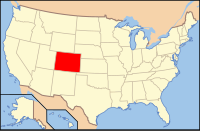Gilpin County, Colorado
| Gilpin County, Colorado | ||
|---|---|---|

The Gilpin Combined Court, the county courthouse.
|
||
|
||
 Location in the U.S. state of Colorado |
||
 Colorado's location in the U.S. |
||
| Founded | November 1, 1861 | |
| Named for | William Gilpin | |
| Seat | Central City | |
| Largest city | Central City | |
| Area | ||
| • Total | 150 sq mi (388 km2) | |
| • Land | 150 sq mi (388 km2) | |
| • Water | 0.4 sq mi (1 km2), 0.2% | |
| Population (est.) | ||
| • (2015) | 5,828 | |
| • Density | 36/sq mi (14/km²) | |
| Congressional district | 2nd | |
| Time zone | Mountain: UTC-7/-6 | |
| Website | www |
|
Gilpin County is the second-least extensive of the 64 counties of the U.S. state of Colorado, behind only the City and County of Broomfield. As of the 2010 census, the population was 5,441. The county seat is Central City. The county was formed in 1861, while Colorado was still a Territory, and was named after Colonel William Gilpin, the first Governor of the Territory of Colorado.
Gilpin County is part of the Denver-Aurora-Lakewood, CO Metropolitan Statistical Area.
According to the U.S. Census Bureau, the county has a total area of 150 square miles (390 km2), of which 150 square miles (390 km2) is land and 0.4 square miles (1.0 km2) (0.2%) is water. It is the second-smallest county by area in Colorado.
As of the census of 2000, there were 4,757 people, 2,043 households, and 1,264 families residing in the county. The population density was 32 people per square mile (12/km²). There were 2,929 housing units at an average density of 20 per square mile (8/km²). The racial makeup of the county was 94.37% White, 0.53% Black or African American, 0.82% Native American, 0.69% Asian, 0.19% Pacific Islander, 1.53% from other races, and 1.87% from two or more races. 4.25% of the population were Hispanic or Latino of any race.
...
Wikipedia

